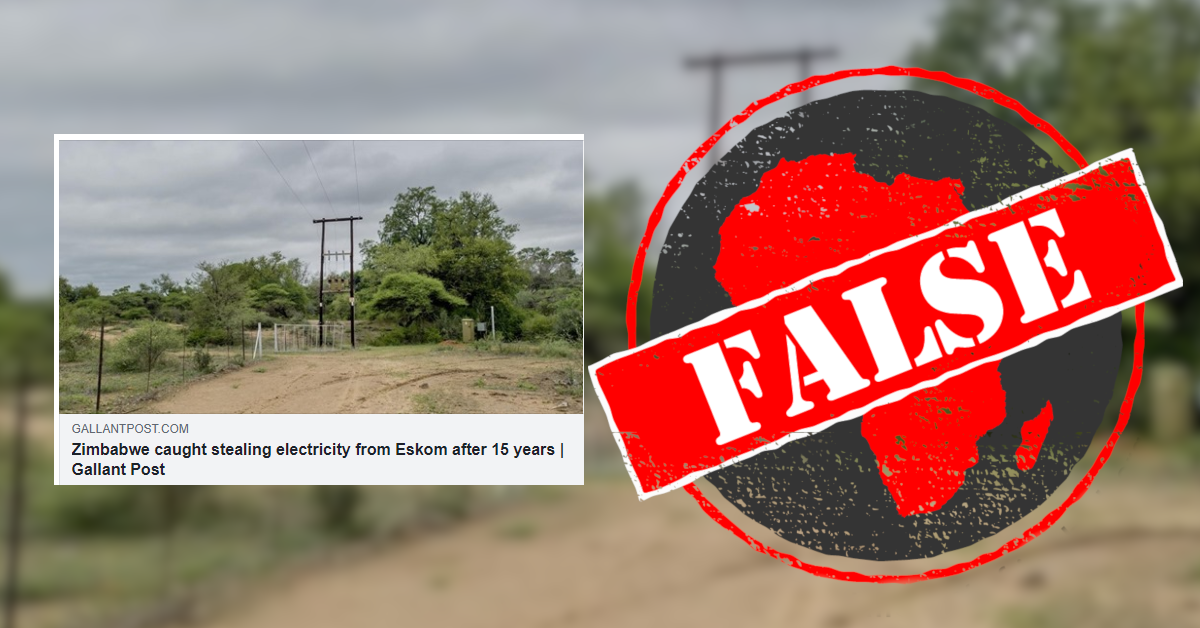“Zimbabwe caught stealing electricity from Eskom after 15 years,” said the headline of an article on the website Gallant Post, published on 10 December 2019.
According to the story, the Zimbabwean government has been running illegal electricity connections from South Africa, through the Limpopo River, which forms the border between the two countries, and into Zimbabwe.
“For the 15 years, Eskom had R2 billion worth of electricity disappear unaccounted for,” said the article. “The Zimbabwean government had been powering almost half of their country from illegal connections and Eskom had been trying to figure out where the lost electricity is actually going without success until the past weekend.”
The Gallant Post article was flagged as possibly false by Facebook’s fact-checking system. Similar stories with the same claim were published on South African satirical website Ihlaya News and shared on social media platforms.
Has Zimbabwe really been stealing electricity from South Africa’s electricity public utility? We investigated.

Eskom claims on its website that it generates about 95% of electricity consumed in South Africa. The company also sells electricity to other African countries, including Zimbabwe.
Eskom has dismissed the claim that Zimbabwe has been stealing electricity from the company, according to a number of South African news organisations, including Independent Online and News24.
Eskom also issued a statement denying the story:
“To set the record straight: Eskom has neither recorded shortfalls in its international power reconciliation nor investigated the Zimbabwe Electricity Supply Authority (ZESA). Energy consumption is accounted through a comprehensive reconciliation process and is independently audited on a regular basis”.
Eskom also made clear that Ihlaya News, where the story originated, publishes satire: “The article is published on Ihlaya News, a parody and satire website, confirming that ‘all articles are complete fiction’. Ihlaya translates to ‘joke’ in isiZulu.”
The Gallant Post does not however link to or indicate the story is from a site focused on satire.
No credible news organisations in South Africa have reported that the Zimbabwean government is stealing electricity from Eskom. The Post’s story is not accurate. – Butchie Seroto
According to the story, the Zimbabwean government has been running illegal electricity connections from South Africa, through the Limpopo River, which forms the border between the two countries, and into Zimbabwe.
“For the 15 years, Eskom had R2 billion worth of electricity disappear unaccounted for,” said the article. “The Zimbabwean government had been powering almost half of their country from illegal connections and Eskom had been trying to figure out where the lost electricity is actually going without success until the past weekend.”
The Gallant Post article was flagged as possibly false by Facebook’s fact-checking system. Similar stories with the same claim were published on South African satirical website Ihlaya News and shared on social media platforms.
Has Zimbabwe really been stealing electricity from South Africa’s electricity public utility? We investigated.

Eskom dismisses ‘fake news’
Eskom claims on its website that it generates about 95% of electricity consumed in South Africa. The company also sells electricity to other African countries, including Zimbabwe.
Eskom has dismissed the claim that Zimbabwe has been stealing electricity from the company, according to a number of South African news organisations, including Independent Online and News24.
Eskom also issued a statement denying the story:
“To set the record straight: Eskom has neither recorded shortfalls in its international power reconciliation nor investigated the Zimbabwe Electricity Supply Authority (ZESA). Energy consumption is accounted through a comprehensive reconciliation process and is independently audited on a regular basis”.
Eskom also made clear that Ihlaya News, where the story originated, publishes satire: “The article is published on Ihlaya News, a parody and satire website, confirming that ‘all articles are complete fiction’. Ihlaya translates to ‘joke’ in isiZulu.”
The Gallant Post does not however link to or indicate the story is from a site focused on satire.
No credible news organisations in South Africa have reported that the Zimbabwean government is stealing electricity from Eskom. The Post’s story is not accurate. – Butchie Seroto
Republish our content for free
For publishers: what to do if your post is rated false
A fact-checker has rated your Facebook or Instagram post as “false”, “altered”, “partly false” or “missing context”. This could have serious consequences. What do you do?
Click on our guide for the steps you should follow.
Publishers guideAfrica Check teams up with Facebook
Africa Check is a partner in Meta's third-party fact-checking programme to help stop the spread of false information on social media.
The content we rate as “false” will be downgraded on Facebook and Instagram. This means fewer people will see it.
You can also help identify false information on Facebook. This guide explains how.


Add new comment